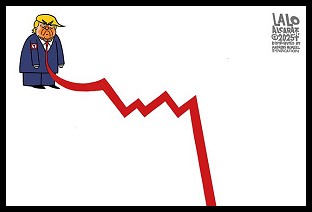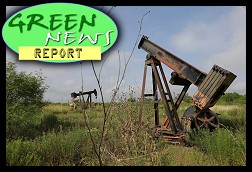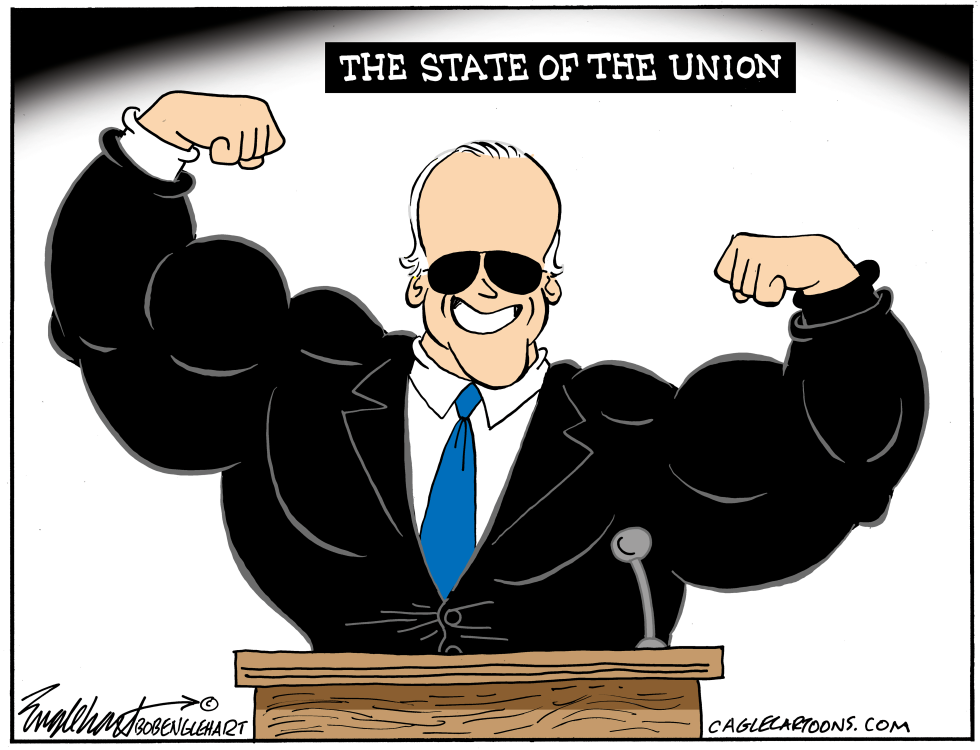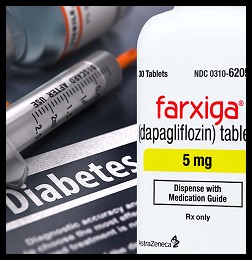Guests: Former Deputy Asst. A.G. Lisa Graves; Legal journalist Chris Geidner; Also: Haley wins a primary; And a Super Tuesday preview...
 In case I haven't mentioned it lately on The BradCast, the U.S. Supreme Court is wildly corrupt. They proved that again on Monday in their ruling on whether Donald Trump, who they don't dispute in their ruling is an insurrectionist, should be disqualified from the 2024 election for having "engaged in insurrection", as barred by the simple text of Section 3 of the 14th Amendment. [Audio link to full show follows this summary.]
In case I haven't mentioned it lately on The BradCast, the U.S. Supreme Court is wildly corrupt. They proved that again on Monday in their ruling on whether Donald Trump, who they don't dispute in their ruling is an insurrectionist, should be disqualified from the 2024 election for having "engaged in insurrection", as barred by the simple text of Section 3 of the 14th Amendment. [Audio link to full show follows this summary.]
We knew this ruling from the corrupt Court was coming, based on their questions at Oral Argument last month. We also knew that the packed, stolen and rightwing SCOTUS majority was corrupt. But their hypocrisy was what shined through most in today's relatively brief 13-page ruling [PDF] and the additional dissenting opinions that followed it. The one by the Democratic appointees was fairly seething.
After years of pretending to be "conservative Constitutionalists"; pretending to be "textualists" who are focused only on the simple meaning of what the words in the founding document say; who pretend to be "originalists", concerned only with what the framers were trying to accomplish at the time they adopted the Constitutional amendment in question, the Court, once again, gave away the ghost. They don't care about any of that. They are an activist rightwing Court finding stuff in the Constitution that doesn't exist to arrive at the political result they wanted in the first place.
On Monday --- in their 9 to 0 opinion (which, the dissenters made clear, was actually a 5 to 4 ruling, but for Democrats on the Court trying to go along to get along in an election year) --- the High Court reversed the Colorado Supreme Court's 213-page ruling [PDF] in December barring Trump from this year's ballot for having violated the Constitution's "Insurrectionist Disqualification Clause". So much for states rights as well, apparently.
But, not only did the SCOTUS majority twist itself into pretzels to come up with "logic" for doing so, they further perverted Section 3 of the 14th Amendment beyond recognition in order to do so. In the bargain, they have killed 14.3 to the point that it can likely never be used to bar insurrectionists from public office --- at least at the federal level. (That's another distinction they made up from whole cloth that appears nowhere in the actual Constitution.)
Congress, the Court decided, must pass a law before the 150 year old 14.3 may be used. It is not self-executing, they ruled, unlike all of the other sections of the 14th Amendment and the other Amendments adopted with it following the Civil War that prohibit slavery, guarantee due process and equal justice under the law for all. But only the two-sentence Section 3, apparently, is not self-executing. At least at the federal level. It can still, apparently, be used by states to bar state and local officials from public office for insurrection for some reason. That, even though Section 3 itself requires a two-thirds super-majority in Congress for the disqualification to be lifted for any insurrectionist to serve in office.
We're joined today by two experts on this matter, former Asst. Deputy Attorney General at the DOJ, LISA GRAVES of True North Research, and "recovering lawyer" and longtime legal journalist CHRIS GEIDNER of Law Dork to try and make sense of what the corrupt, hypocritical Justices did.
Geidner details how the dissenters in this case, the Court's three Democratic Justices, Sotomayor, Kagan and Jackson --- but also, in part, even Justice Amy Coney Barrett --- "explained how the majority had basically cut off the use of Section 3 going forward."
And they did so, according to Graves, in the most cowardly way, with a per curiam decision that speaks for the whole court, without saying who actually wrote it. "Like Bush v. Gore," they didn't sign their names to, she observed, noting that "issuing a per curiam opinion is an act of cowardice by these rightwing justices."
Geidner adds: "It truly is just an example, like 'Bush v. Gore', of 'Let's work backwards from the principle that we want, and we're going to shoehorn in some principle of law that clearly can't make sense in light of the interpretation of these amendments over the past 150 years.'"
"The Colorado Supreme Court's decision was so well-reasoned," Graves argues about the ruling overturned by SCOTUS today. "It sought to vindicate the plain language of the 14th Amendment. But here you had the Supreme Court not wanting to allow Colorado to make that independent determination based on the plain language. It really shows how outrageous this anonymous Republican-appointee decision --- how outrageous and wrong --- that decision is." She also notes, given what was actually a 5 to 4 ruling, how outrageous it is that Justice Clarence Thomas --- whose wife actually participated in the insurrection --- didn't bother to recuse himself.
Last Summer, Geidner tells us, when he wrote about this case, he says he argued, "It's pretty clear that Trump is barred from being President again. Will it matter?" He adds: "That was the right question to ask, and we got our answer today."
As usual, there is much more covered in today's program on all of this, so please tune in for the full show.
Also today, a wrap-up of of the weekend's GOP nominating contests in which Nikki Haley finally notched her first primary victory after Trump actually threatened the voters participating in it. And we close with a preview of tomorrow's 15-state Super Tuesday primaries in Alabama, Alaska, Arkansas, California, Colorado, Maine, Massachusetts, Minnesota, North Carolina, Oklahoma, Tennessee, Texas, Utah, Vermont, Virginia, and American Samoa. If you live in one of those states and have yet to vote, NOW is the time!...
 CLICK TO LISTEN OR DOWNLOAD SHOW!...
CLICK TO LISTEN OR DOWNLOAD SHOW!...
* * *While we post The BradCast
here every day, and you can hear it across all of our great affiliate stations and websites, to automagically get new episodes as soon as they're available sent right to your computer or personal device, subscribe for free at iTunes, Pandora, TuneIn, Google, Amazon or our native RSS feed!
* * *



 Sunday 'Zero Day' Toons
Sunday 'Zero Day' Toons Soc. Sec. Expert Warns DOGE Hastening Collapse, Privati-zation: 'BradCast' 4/10/2025
Soc. Sec. Expert Warns DOGE Hastening Collapse, Privati-zation: 'BradCast' 4/10/2025 'Green News Report' 4/10/25
'Green News Report' 4/10/25
 Trump Blinks, Chaos Reigns, Markets Spike as Many Tariffs Remain Despite 90-Day 'Pause': 'BradCast' 4/9/25
Trump Blinks, Chaos Reigns, Markets Spike as Many Tariffs Remain Despite 90-Day 'Pause': 'BradCast' 4/9/25 SCOTUS Deportation Ruling Grimmer Than First Appears: 'BradCast' 4/8/25
SCOTUS Deportation Ruling Grimmer Than First Appears: 'BradCast' 4/8/25 'Green News Report' 4/8/25
'Green News Report' 4/8/25 Cliff Diving with Donald: 'BradCast' 4/7/25
Cliff Diving with Donald: 'BradCast' 4/7/25 Sunday 'Don't Look Down' Toons
Sunday 'Don't Look Down' Toons 'Green News Report' 4/3/25
'Green News Report' 4/3/25 'Mob Boss' Trump's Trade Sanctions Tank U.S., World Markets: 'BradCast' 4/3/25
'Mob Boss' Trump's Trade Sanctions Tank U.S., World Markets: 'BradCast' 4/3/25 Crawford Landslide in WI; Booker Makes History in U.S. Senate: 'BradCast' 4/2/25
Crawford Landslide in WI; Booker Makes History in U.S. Senate: 'BradCast' 4/2/25 Judge Ends Challenge to GA's Unverifiable, Insecure Vote System: 'BradCast' 4/1/25
Judge Ends Challenge to GA's Unverifiable, Insecure Vote System: 'BradCast' 4/1/25 Bad Court, Election News for Trump is Good News for U.S.: 'BradCast' 3/31
Bad Court, Election News for Trump is Good News for U.S.: 'BradCast' 3/31 Vets Push Back at Plan to Slash Health Care, 80K V.A. Jobs: 'BradCast' 3/27/25
Vets Push Back at Plan to Slash Health Care, 80K V.A. Jobs: 'BradCast' 3/27/25 Signal Scandal Worsens for Trump, GOP; Big Dem Election Wins in PA: 'BradCast' 3/26
Signal Scandal Worsens for Trump, GOP; Big Dem Election Wins in PA: 'BradCast' 3/26 'Emptywheel': Trump NatSec Team Should 'Resign in Disgrace': 'BradCast' 3/25/25
'Emptywheel': Trump NatSec Team Should 'Resign in Disgrace': 'BradCast' 3/25/25 USPS 'Belongs to the People, Not the Billionaires': 'BradCast' 3/24/25
USPS 'Belongs to the People, Not the Billionaires': 'BradCast' 3/24/25
 VA GOP VOTER REG FRAUDSTER OFF HOOK
VA GOP VOTER REG FRAUDSTER OFF HOOK Criminal GOP Voter Registration Fraud Probe Expanding in VA
Criminal GOP Voter Registration Fraud Probe Expanding in VA DOJ PROBE SOUGHT AFTER VA ARREST
DOJ PROBE SOUGHT AFTER VA ARREST Arrest in VA: GOP Voter Reg Scandal Widens
Arrest in VA: GOP Voter Reg Scandal Widens ALL TOGETHER: ROVE, SPROUL, KOCHS, RNC
ALL TOGETHER: ROVE, SPROUL, KOCHS, RNC LATimes: RNC's 'Fired' Sproul Working for Repubs in 'as Many as 30 States'
LATimes: RNC's 'Fired' Sproul Working for Repubs in 'as Many as 30 States' 'Fired' Sproul Group 'Cloned', Still Working for Republicans in At Least 10 States
'Fired' Sproul Group 'Cloned', Still Working for Republicans in At Least 10 States FINALLY: FOX ON GOP REG FRAUD SCANDAL
FINALLY: FOX ON GOP REG FRAUD SCANDAL COLORADO FOLLOWS FLORIDA WITH GOP CRIMINAL INVESTIGATION
COLORADO FOLLOWS FLORIDA WITH GOP CRIMINAL INVESTIGATION CRIMINAL PROBE LAUNCHED INTO GOP VOTER REGISTRATION FRAUD SCANDAL IN FL
CRIMINAL PROBE LAUNCHED INTO GOP VOTER REGISTRATION FRAUD SCANDAL IN FL Brad Breaks PA Photo ID & GOP Registration Fraud Scandal News on Hartmann TV
Brad Breaks PA Photo ID & GOP Registration Fraud Scandal News on Hartmann TV  CAUGHT ON TAPE: COORDINATED NATIONWIDE GOP VOTER REG SCAM
CAUGHT ON TAPE: COORDINATED NATIONWIDE GOP VOTER REG SCAM CRIMINAL ELECTION FRAUD COMPLAINT FILED AGAINST GOP 'FRAUD' FIRM
CRIMINAL ELECTION FRAUD COMPLAINT FILED AGAINST GOP 'FRAUD' FIRM RICK SCOTT GETS ROLLED IN GOP REGISTRATION FRAUD SCANDAL
RICK SCOTT GETS ROLLED IN GOP REGISTRATION FRAUD SCANDAL VIDEO: Brad Breaks GOP Reg Fraud Scandal on Hartmann TV
VIDEO: Brad Breaks GOP Reg Fraud Scandal on Hartmann TV RNC FIRES NATIONAL VOTER REGISTRATION FIRM FOR FRAUD
RNC FIRES NATIONAL VOTER REGISTRATION FIRM FOR FRAUD EXCLUSIVE: Intvw w/ FL Official Who First Discovered GOP Reg Fraud
EXCLUSIVE: Intvw w/ FL Official Who First Discovered GOP Reg Fraud GOP REGISTRATION FRAUD FOUND IN FL
GOP REGISTRATION FRAUD FOUND IN FL


























 On today's
On today's  Corporate media failure and a small, if noteworthy, success (for a change) are just part of today's
Corporate media failure and a small, if noteworthy, success (for a change) are just part of today's 
 We were able to open up the phones today to listeners regarding last week's State of the Union Address, the GOP's stunningly failed Rebuttal, and what has become a seemingly annual debate on
We were able to open up the phones today to listeners regarding last week's State of the Union Address, the GOP's stunningly failed Rebuttal, and what has become a seemingly annual debate on  The cynical "Say the Name Laken Riley" State of the Union stunt by MAGA Republicans underscores the hypocrisy of the longtime
The cynical "Say the Name Laken Riley" State of the Union stunt by MAGA Republicans underscores the hypocrisy of the longtime 
 On today's
On today's 
 On today's
On today's  In the
In the  We'll have likely-unsurprising results from today's Super Tuesday elections in 16 states on tomorrow's
We'll have likely-unsurprising results from today's Super Tuesday elections in 16 states on tomorrow's 
 In case I haven't mentioned it lately on
In case I haven't mentioned it lately on 













